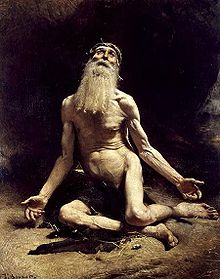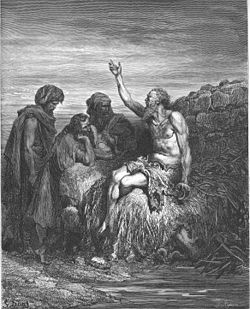Bible: What Does Job 20-23 Teach Us About Wealth, the Wicked, and God's Sovereignty?
Wealth and the Wicked

The Cursed Life of the Wicked
Zophar's spirit, upset by Job's reproof, moves him to respond (vv. 1-3).
He sermonizes about the temporary victory of the wicked (vv. 4-6), but also about that evil individual’s sudden demise for eternity (vv. 7, 9).
He compares that existence to a transient dream (v. 8).
The posterity of the wicked man cannot enjoy their inheritance, but must return it to those from whom their father "stole" it (v. 10).
The strength of youth will not avail that man in death (v. 11).
The wicked harbors evil thoughts and words (vv. 12-13).
Equating sour food in the stomach with ill-gotten riches, Zophar graphically pictures God as providing the emetic for the wicked (vv. 14-15).
In other, less vivid words, God does not allow the wicked to keep his riches.
Apparently, however, the latter continues to seek wealth falsely, caring not that it will lead to his death (v. 16).
Cause of the Wicked Man's Misery
view quiz statisticsWhy The Wicked Cannot Enjoy Their Wealth
What is the bottom line? He will not "make it" (v. 17); he will have to give back money that he worked for and thus not be allowed to use it (v. 18a).
Neither will he find pleasure with what profit he can use (v. 18b). Verse 19 provides the reason for these failures: oppression of the poor.
[Here the dynamic equivalence interpretation of the NIV clarifies the meaning of the text; the NKJV and NASB, while more literal grammatically, are vague and difficult to understand.
That is not to say that this writer always prefers the NIV to the other two texts].
The wicked is anxious about not having enough, so he greedily devours everything (v. 20); when nothing remains, his standard of living plummets (v. 21).
The poor harass him for a handout when he has much (v. 22); even God will not allow him to eat in peace (v. 23).
While trying to escape from one trouble, another will bring him down (vv. 24-25); fear, darkness, and fire await him and his own (v. 26).
All creation is a hostile witness against him (v. 27), and God will see to the destruction of his possessions (v. 28).
Zophar concludes as did Bildad (v. 29; cf. 18:21).
[What vivid imagery! Zophar continues the traditional wisdom tack that Bildad began, presenting only one side of the truth].
Job

Job 21
Job asks his friends to listen patiently to his complaint (vv. 1-3).
Verse four indicates that
(1) his controversy is with God, not man, and
(2) they shouldn't be surprised at his impatience, because they have given him sufficient cause to act thus.
(Or it may be that he is impatient because God has delayed his restoration.)
His appearance should astonish them, even as the memory of his pain makes him afraid (vv. 5-6).
"The Rest of the Story"
view quiz statisticsJob: The Wicked Lead a Carefree Life
Then he begins a discourse on a different perspective regarding the wicked; namely, their carefree, prosperous life (vv. 7-13), despite their rejection of God (vv. 14-15).
Job denies any adherence to their fleshly wisdom (v. 16).
Two questions suggest that the wicked rarely, if ever, experience judgment in this life (v. 17).
[The NIV and the NASB include another question expecting a similar negative answer in verse 18, but the NKJV interprets the verse as an assertion that implies that the wicked are judged. The former interpretation makes better sense].
Common wisdom states that the children suffer for the parent's sins (v. 19a).
Job thinks that the sinner should suffer for his own wickedness (vv. 19b-20), because the sinner does not care what happens to his children after he's dead (v. 21).
God judges both the rich who dies early and the poor who dies bitter, and His judgment cannot be contested (vv. 22-26).
Then Job confronts his friends about their schemes against him (v. 27).
By their questions they try to prove that Job fits the descriptions of the wicked (v. 28).
Travelers through those parts would tell them that the wicked man is not judged during his earthly life (vv. 29-31, NIV).
Instead, when the evil one dies, his grave is guarded; he has a pleasant burial spot, and his funeral displays a well-attended procession (vv. 32-33).
Job recognizes the half-truths in his friends' answers, and calls them comfortless (v. 34).
[Job realizes that life is oftentimes unfair and uncertain, and that God's ways are inscrutable.
His defense in this chapter presents the other side of Zophar's reasoning].
Job With His "Friends"

Job 22
Eliphaz begins his discourse with five questions that lead up to how he thinks Job found himself in his predicament (vv. 1-5).
The first three expect a negative answer, and imply that while man's wisdom and righteousness may benefit himself, they have no such effect upon God (vv. 2-3).
With this conclusion, Eliphaz suggests that God does not need Job’s help to rule the universe.
Also anticipating a negative response, his fourth question proposes the patent absurdity that Job's fear of God caused His reproof (v. 4).
With the fifth, the "wise man" explicitly states his reason for God's judgment: Job's great iniquity (v. 5).
Accusing him of unmitigated cruelty against the poor (vv. 6-7, 9), Eliphaz contrasts Job’s current status with that of “the man of honor” (v. 8).
Such is this friend’s explanation for Job’s condition (vv. 10-11).
Job next fields more criticism for thinking (according to his assailant) that God does not know the truth, since He supposedly cannot see what is going on (vv. 12-14).
Eliphaz believes that Job is following the same path that the Flood victims took (vv. 15-18), and that he deserves the same ridicule (vv. 19-20).
He instructs Job to know God and listen to His word (vv. 21-22), return to Him for restoration (v. 23), and find his treasure in the LORD rather than in money (vv. 24-26).
Eliphaz promises Job four results:
(1) God will answer his prayer (v. 27);
(2) people will accept his decisions (v. 28);
(3) the LORD will save him from his detractors (v. 29); and
(4) God will use his testimony to save the guilty (v. 30).
[Eliphaz is grasping for straws here, proposing some ludicrous and false conclusions.
His patronizing attitude toward the suffering man is both pitiful and pitiless].
Acknowledging God's Sovereignty

Job 23
Job expresses his frustration that he cannot find God (vv. 1-3).
If he could, he says he would argue his case before Him (v. 4), understand God's rationale (v. 5), and receive an acquittal (vv. 6-7).
Although he searches everywhere to find Him, he has no success (vv. 8-9); still, Job states confidently that after this time of trial, he will be vindicated (v. 10).
He professes his loyalty to God and His word (vv. 11-12), and acknowledges the LORD's sovereignty (vv. 13-14).
While expressing fear of what He could allow to come upon him next, Job does not keep silent (vv. 15-17).
[God often hides His face and purposes from the sufferer; Job showed a remarkable faith that He would one day make things right].
© 2014 glynch1








